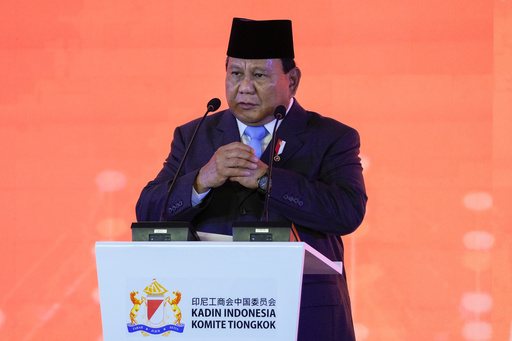
BEIJING — The newly inaugurated Indonesian president has emphasized the necessity of cooperation with China instead of conflict, following the signing of significant agreements amounting to $10 billion during a business conference held in China’s capital on Sunday. This meeting occurred as the president prepared for his upcoming visit to the United States.
President Prabowo Subianto expressed at the forum his aspiration for Indonesia to engage with China not just as an economic ally but also as a partner in fostering cultural and civilizational growth. He iterated, “We must give an example that in this modern age, collaboration — not confrontation — is the way for peace and prosperity.”
Subianto’s visit marks his first international trip since taking office three weeks prior, commencing in China before he travels to Washington. His itinerary also includes stops in Peru and Brazil, where he plans to attend the Asia-Pacific Economic Cooperation summit and the Group of 20 summit.
During discussions with Chinese President Xi Jinping, both leaders agreed to enhance their cooperative relationship, introducing a new security dimension as a fifth “pillar” of their collaboration, alongside political, economic, maritime, and cultural exchanges. Their joint announcement highlighted plans for an unprecedented meeting of their foreign and defense ministers, scheduled for 2025.
Subianto clarified Indonesia’s long-standing nonaligned stance, asserting, “Indonesia is very clear. We have always been nonaligned, we have always been respectful of all great powers in the world.” Despite not having a formal dispute with China, Indonesia has managed to navigate its own interests amid the ongoing territorial tensions in the South China Sea involving China and its neighboring countries. Recently, Indonesian patrols have successfully discouraged Chinese vessels from interfering with Indonesia’s energy exploration activities.
Chinese investments, particularly in the mining sector, have been substantial in Indonesia, mirroring their investments globally. Furthermore, China played a crucial role in constructing Indonesia’s inaugural high-speed railway, a significant 142-kilometer (88-mile) line connecting Jakarta and Bandung, which began operations last year.
However, the influx of competitively priced Chinese goods has adversely impacted Indonesia’s garment industry, leading to factory closures and calls for the implementation of import tariffs. The Indonesian government faces the challenge of supporting its domestic manufacturers while maintaining a positive relationship with its largest trading partner.
